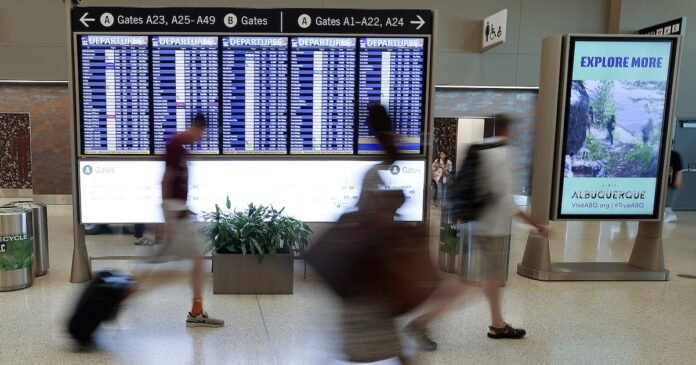Travel between Utah’s largest airport and Canada has been “a little slow” so far this year, despite the airport offering over a dozen weekly flights between four major Canadian cities, the airport’s top official points out.
Bill Wyatt, director of Salt Lake City International Airport, says it differs from other international travel trends he has seen. Flights between Mexican cities remain steady, while he’s also optimistic about travel to European countries. The airport’s first flight to Asia in over a decade, which took off on Thursday, was also fully booked.
“I think it’ll vary by country, but so far it’s been strong (overall),” he told KSL.com.
The loss of Canadian travelers isn’t unique to just Salt Lake City International Airport. Canadian-resident air travel last month ended up down about 4% from last May, while Canadian road trips to the U.S. are down a whopping 38%, according to data published by Statistics Canada this week, the nation’s statistics agency.
That’s significant for Utah because the country accounted for 28% of the state’s international travel in 2023, per the University of Utah Kem C. Gardner Policy Institute. Canadian travelers also spent more in Utah’s economy than travelers from any other country that year, according to the Utah Office of Tourism.
So why are Canadians ditching the U.S. this year?
Some are following through on threats to boycott the U.S. over policy changes, but that’s not the only reason, according to a new survey published by Salt Lake City-based Love Communications on Thursday.
The company surveyed nearly 750 Canadian adults in April to gauge consumer sentiment. Half of those surveyed had plans to travel to the U.S., and half had recently canceled their plans.
April was a particularly interesting time in U.S.-Canada relations, BreAnne Sahleen, a marketing analytics and research supervisor at Love Communications, points out. President Donald Trump maintained a 25% tariff on Canada as part of his “Liberation Day” plans on April 2, and he had already talked about making Canada the “51st state.“
There have been plenty of back-and-forth tariff changes, delays and retaliatory tariffs since Liberation Day, but U.S. and Canada still had tariffs on some goods that remained as high as 10% to 25% by the end of May, per Yale University’s Budget Lab. The country’s two leaders have also been in talks to lift those tariffs, potentially, Reuters reported last week.
Many Canadians, as NBC News reported, have threatened to boycott U.S. products since the threat of new tariffs began. It was also a key factor in why Canadians whom Love surveyed canceled their trips to the U.S.
One-third reported having a negative view of the U.S., as compared to about 12% who had a favorable view. Nearly half cited “recent policy changes” for their perception becoming more negative, according to the survey. Many reported feeling “distrust,” “disapproval” and “anger” toward the U.S., feelings that were even stronger among those who had canceled their U.S. travel plans.
Over three-fourths of respondents who canceled said their decision was tied to the boycott.
“I’m boycotting U.S. travel until all tariffs against Canada are lifted,” one person wrote.
Meanwhile, increasing travel costs and currency exchange rates were also significant factors that contributed to the hesitancy of some respondents.
The Canadian dollar is currently worth $0.73 in U.S. currency, which is the same as mid-June 2024 but 10 cents below its five-year max. With travel costs rising, including in the U.S., some said they didn’t want to make the trip.
“Cost was definitely a big factor,” Sahleen said.
Those who still planned to visit said they had family in the U.S. or that there were beloved parts of the country they wanted to revisit. One person, for example, said they would travel to go golfing in Florida during the winter.
The hesitancy from others may not last forever, either.
Despite the negative feelings, about two-thirds of respondents still reported they’d consider traveling the U.S. within the next three years. One respondent, Sahleen noted, said they’d see how everything plays out over the next year or two before deciding on their plans.
“We did see a significant amount of people say they would consider traveling in the future,” she said. “I think there is intent to travel if things between Canada and the U.S. become less contentious.”






